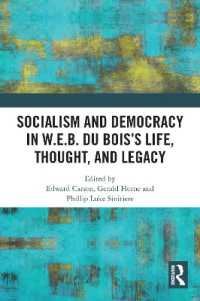Full Description
Daniel Goldhagen's study of the Holocaust offers conclusions that run directly counter to those reached by Christopher Browning, whose book Ordinary Men is also the subject of a Macat analysis. As such, the two analyses make possible some interesting critical thinking exercises focused on evaluation of the evidence used by the two historians. For Goldhagen, a chief reason for German actions was not the mundane good comradeship stressed by Browning, but a longstanding hatred of Jews and Judaism specific to Germany that dated back well into the previous century. Debating which historian is right, which has made better use of the available evidence, which has most successfully written objectively - and which advances the most secure interpretation of contested documents - forces students to think critically about one of the most important and (on the surface at least) incomprehensible events of the past century.
Contents
Ways in to the Text Who was Daniel Jonah Goldhagen? What does Hitler's Willing Executioners say? Why does Hitler's Willing Executioners matter? Section 1: Influences Module 1: The Author and the Historical Context Module 2: Academic Context Module 3: The Problem Module 4: The Author's Contribution Section 2: Ideas Module 5: Main Ideas Module 6: Secondary Ideas Module 7: Achievement Module 8: Place in the Author's Work Section 3: Impact Module 9: The First Responses Module 10: The Evolving Debate Module 11: Impact and Influence Today Module 12: Where Next? Glossary of Terms People Mentioned in the Text Works Cited






